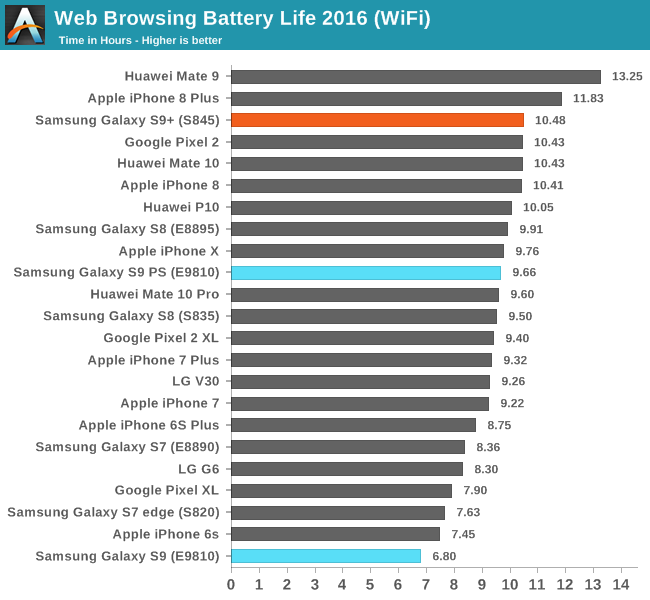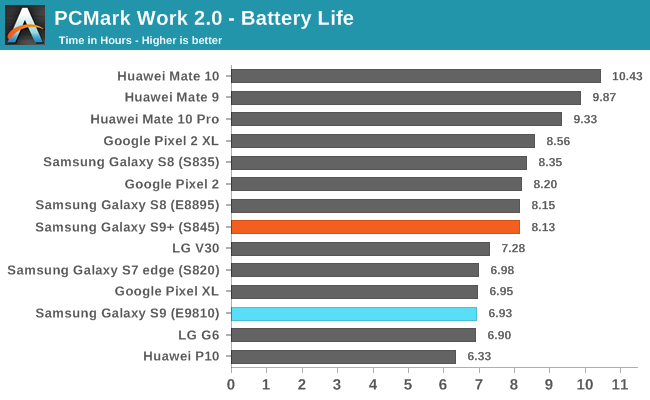The Samsung Galaxy S9 and S9+ Review: Exynos and Snapdragon at 960fps
by Andrei Frumusanu on March 26, 2018 10:00 AM ESTBattery Life - A Stark Contrast
We extensively covered the performance of the Snapdragon and Exynos Galaxy S9’s – what remains to be seen is how that performance affects battery life in our standard tests. Performance between the regular and larger Galaxy S9 doesn’t change, however battery life may differ based on the variant as the regular S9 sports a 3000mAh (11.55Wh) battery versus the 16% higher 3500mAh (13.47Wh) of the Galaxy S9+. Naturally the 14.2% bigger screen area of the S9+ offsets some of that advantage.
Unfortunately for this review we couldn’t get identical variants of the different SoC Galaxy S9s – our S9+ is a Snapdragon 845 unit while our S9 is an Exynos 9810 unit, so we weren’t able to execute a true apples-to-apples comparisons between the SoC variant, however as we’ll see the delta between the units is large enough that it won’t change the conclusion.
Our web browsing test tries to mimic real-world usage patterns of browsing websites. This includes iterating through a list of websites and scrolling through them. In this test, screen efficiency and battery size play a role, but also we balanced it so that it also sufficiently stresses the SoC (CPU, GPU and display pipeline) as well.

The Snapdragon 845 Galaxy S9+ posted excellent battery life in our test and lands only third to the iPhone 8 Plus and the Mate 9. Unfortunately we never tested the S8+ to see the generational difference, but it shouldn’t be too different from the S835 regular S8 at around the 10 hour mark.
The Exynos 9810 Galaxy S9 absolutely fell flat on its face in this test and posted the worst results among our tracking of the latest generation devices, lasting 3 hours less than the Exynos 8895 Galaxy S8. This was such a terrible run that I redid the test and still resulted in the same runtime.
I investigated the matter further to try to see if this was caused by the high energy usage of the M3 cores – and it seems it is. Enabling the “CPU limiter” (S9 PS result in the graphs) which is found in the battery optimisation options of Samsung’s firmware greatly throttles the M3 cores down to 1469 MHz, memory controller to half speed and also seemingly changes some scheduler settings to make them more conservative. This results in peak performance equal to the Exynos 8895- however the scheduler alterations also noticeably slow down UI responsiveness so it’s actually a worse experience. Nevertheless, backing off on performance results in regaining almost 3 hours.
This is such a terrible battery performance of the Exynos 9810 variant that it again puts even more clout into the new SoC. My theory as to why this happens is that not only do the higher frequency state require more energy per work done than competing SoCs – because this is a big CPU complex there’s also lots of leakage at play. The DVFS system being so slow might actually be bad for energy here as we might be seeing the opposite of race-to-sleep, walk-to-waste. The fact that Apple’s SoCs don’t have any issues with battery life in this test showcases that it’s not an inherent problem of having a high-power micro-architecture, but rather something specific to the Exynos 9810.

In PCMark the disadvantage of the Exynos 9810 S9 isn’t as pronounced as in the web test, however it’s again a regression to the Exynos 8895 S8 – all while not posting a meaningful performance advantage over its predecessor that might explain the lower battery life.
The Snapdragon 845 Galaxy S9+ fared relatively well, even though it’s not quite as good as other devices.
In my personal every-day usage I can’t saw that I noticed a massive disadvantage in battery life on the Galaxy S9, however my everyday usage is relatively light and I haven’t had enough time with the phone yet as a daily driver to make a final judgment. I did notice that the Exynos 9810 does shows signs of suffering in heavy tasks. Instances of Gmail syncing my inbox with a new account did once result in a warm phone while the Snapdragon 845 Galaxy S9 did not showcase this characteristic.
I can’t fault the Snapdragon S9+ in the time I had it, but again I haven’t had enough real time with it to really judge it subjectively. As far as AnandTech testing goes, the data speaks for itself and based on what I’ve seen I strongly do not recommend the Exynos variant of the Galaxy S9 in its current state, especially if you’re a regular user of heavy apps.
Over the coming weeks I’m planning to try to dive into the workings of the Exynos 9810 and post a follow-up article on whether it’s possible to improve both in terms of performance as well as battery life if one changes the way the SoC’s scheduler and DVFS works. In the eventuality that Samsung updates its firmware to resolve these large issues with the Exynos Galaxies, then we’ll revisit the matter as soon as possible.










190 Comments
View All Comments
Infy2 - Monday, March 26, 2018 - link
Thank you very much for a thorough phone review. I had almost lost hope that AT no long publishes such reviews!sturmen - Monday, March 26, 2018 - link
Did no one else notice the Lorem Ipsum in the "Video Evaluation" section?trenzterra - Monday, March 26, 2018 - link
I really appreciate your explanation of the black clipping issue on the S9+. Given this, is this a hardware limitation on the S9+'s panel or is it that the S9+ panels are calibrated to have darker blacks? In a not-so-dark room, I noticed that videos on the S9+ looks gorgeous whereas on my older S7 edge, I could see lots of banding in the grey areas. Was this perhaps done intentionally?jordanclock - Monday, March 26, 2018 - link
The black clipping can be mitigated by adjusting the gamma curve, which I believe can be controlled without root and certainly could be fixed with updates.name99 - Tuesday, March 27, 2018 - link
Not true. Changing a gamma curve can't change the fact that your panel's minimum "on" brightness is too bright compared too off and thereby noticeable. All changing the gamma curve will do is move where the posterization occurs.Apple's is the correct solution (dithering) for this sort of problem, until the panel hardware is refined.
StevoLincolnite - Tuesday, March 27, 2018 - link
What I am not a fan of is that aspect ratio... I watch allot of media and would have preferred to retain 16:9.Also. Glass. Ugh.
Omega244 - Monday, March 26, 2018 - link
3000 mAh (13.47Wh)non-replaceable 3500 mAh (11.55Wh)
non-replaceable
I think the battery specs are swapped on Page 1
TMCThomas - Monday, March 26, 2018 - link
Hmm that Exynos peformance and battery life is indeed quite dissapointing. I'm currently still on the Galaxy s5+ and I really wanted to upgrade to this device since it's about time right now. But I'm not going to pay such a high price for a device which has big problems with it's peformance and battery life. My s5+ also has battery life that has never actually been very good (screen on time never exceeding 3 hours mostly between 1 and 2) Device always seemed to be overheating and I couldn't play a game (at the desired performance) for longer than 10 minutes since the Adreno 420 would have dropped from 600mhz tot 240MHZ which made the framerate in the more graphicly intense games going below 30 fps Mostly around the 20fps mark. I'm not planning to go for an experience like that again. It's a shame that they don't sell the Snapdragon version here in The Netherlands. Would have for sure bought that one but i'm not so sure with the exynos variant. I really hope that they can fix these issue's with some software update (and I hope to see an update from you guys if they do ;) But I don't expect it to be honest. sigh I might be waiting another year for the s10 or sX of whatever they're going to call it, if I haven't switched to another brand by that time. We'll see how this will go but for now I'll hold of to buy one.lopri - Monday, March 26, 2018 - link
The S8 hás the best ergonomics, and the S9 might be one of the best, but I submit that S9+ is one of the worst in that regard with the protruding frame digging in the hand like a wire. The matte coating does not help in the grip, either.Zhenocnra - Monday, March 26, 2018 - link
Since when did the SD 845 have 4k video recording at 60FPS enabled on the S9 and S9+? Last time I checked, Samsung still hasn't enabled that feature on the S9 or S9+.